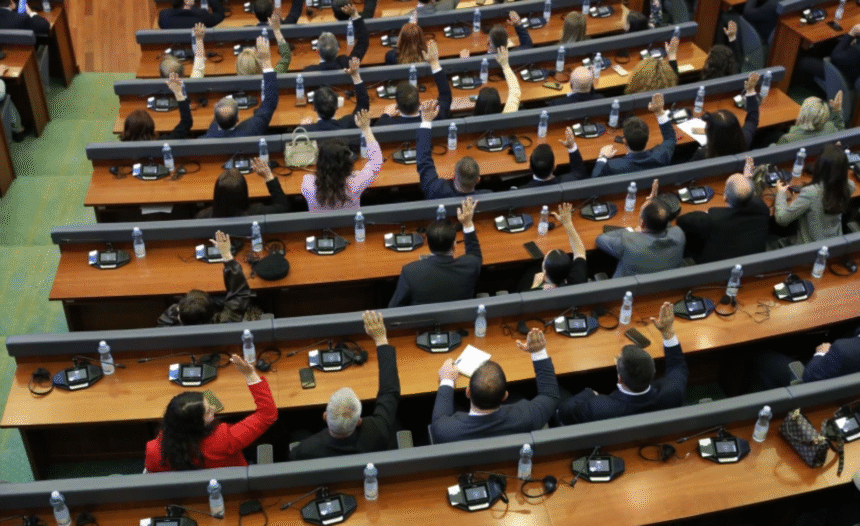In the 11th attempt to constitute the Assembly, it is expected that a third vote for the Electoral Commission for secret voting will take place again. Opposition MPs have requested clarifications from the Assembly administration. The administration was asked to prepare for the vote that failed, and it itself has requested that the proposed name for the Speaker of the Assembly be established in the session first.
The 11th attempt to constitute the Assembly, which started on April 15, will take place on Monday.
Once again, it is expected that the winning party will continue its attempt to introduce secret voting – initially with the formation of the Electoral Commission for secret voting for the Speaker of the Assembly.
PDK MP Ganimete Musliu said that the state has remained without institutions because, as she put it, “Albulena has decided to become the puppet of Albin.”
“Albulena is allowing her name to be the weapon with which Albin intends to kill our democracy. She is the cause of an institutional, political, and moral crisis. But they won’t succeed. Not even a thousand Albins and Albulenas can kill this state. They will remain only as two stains on the institutional path of the Republic of Kosovo. Ten times they tried, ten times they failed. Meanwhile, Donika, Mimoza, and Peci are trying to sell the mind of the entire Kosovo, but to sell minds, you first need to have one,” Musliu said.
According to the Assembly Administration, regarding the proposal for secret voting, it can be decided if 50 percent plus one MP votes in favor – for example, when 31 votes are in favor and 61 deputies participate in the vote.
On May 1, LDK’s Hykmete Bajrami and PDK’s Abelard Tahiri stayed with the Assembly administration chief for about 10 minutes.
According to Bajrami, the reason was that they had heard that there would be an attempt to introduce secret voting.
“We asked the Secretary of the Assembly if the information circulating was true, that there was an attempt to change the form of voting, and he confirmed it, saying that they had received a request from Mr. Dehari for the Secretariat to prepare for a secret vote,” she said.
Arben Loshi, the Deputy Secretary General of the Assembly, said that the request to prepare for a secret vote was received at the time when the May 1 session was supposed to start.
However, he said that he requested that the name to be put on the ballot be officially confirmed in the session first.
He also said that the interpretation of the rules is up to the session leader, who, as he explains, changed the plan for open voting.
“From the first scenario that began on April 15, everything has been in accordance with the Constitution, in accordance with the Assembly Rules of Procedure, and in line with the practices of the previous eight legislatures. Any changes that might happen on the spot are another issue that, according to the Assembly Rules of Procedure, the session leader interprets the rules – the president or the leader. We, as the administration, are a professional body and we are not politicians. We serve all political subjects that have won mandates in the Assembly with objectivity,” Loshi said.
So far, the opposition parties have called the attempt to move to secret voting as an action contrary to the Assembly Rules of Procedure and the Constitution.
They have emphasized that LVV (Self-Determination Movement) has deviated from the scenario of the session prepared by the Assembly Secretariat. Meanwhile, the Self-Determination Movement refers to the 2014 ruling of the Constitutional Court.
“Point 128. In the constitution of the Assembly, all MPs must be present and vote as they wish, either openly or secretly, voting ‘for,’ ‘against,’ or ‘abstaining,’ and they cannot be exempted from acting in this way,” the ruling states.
The head of the Assembly Secretariat said that the scenario with which the session started is in line with what has been applied in previous legislatures.
When asked if the administration takes responsibility if any violation occurs, he said that the legal responsibility lies with the session leader, while for the advice given by the administration, they take full responsibility.
“In the scenario on May 1, the continuation – open voting – was planned. The candidate did not pass in the previous session, and we remained there… The session leader assessed that secret voting was possible, for which, at the beginning of the continuation of the constitutional session, they informed the MPs. We asked the session leader that since we are entering into secret voting, a temporary electoral commission should be established and we need 15 minutes to make preparations for secret voting, and in this case, the commission should be made up of members from all political subjects, as there are no parliamentary groups… The administration did not suggest either open or secret voting,” Loshi said.
As Loshi said, the vote regarding the formation of the Electoral Commission will be repeated, as it now counts as a half-point since there was no majority of MPs who expressed their will by voting for or against the proposal.
If the majority of MPs vote, a response can be given to the proposal, either moving it forward or rejecting it.
The constitutional session began on April 15, and the proposal to elect Albulena Haxhiu as Speaker of the Assembly has failed in six votes.







